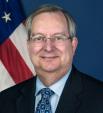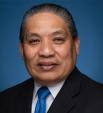Moderators & Panelists | AV TEST Initiative Tracking Tool Launch and Panel Discussions
Panel Discussion: Automated Driving Systems and Rural Safety
Jon R. Krohmer, M.D., FACEP, FAEMS

Director, Office of EMS, NHTSA
Jon R. Krohmer, M.D., FACEP, FAEMS, is the Director of the NHTSA Office of EMS in the Department of Transportation. He also served as the NHTSA Acting Associate Administrator for Research and Program Development from October 2018 to January 2020. Prior to NHTSA, he was the Assistant Director of the ICE Health Service Corps at the Department of Homeland Security (DHS). Previously, he was the principal deputy assistant secretary for the DHS Office of Health Affairs and DHS deputy chief medical officer. He began serving in that position as a member of the Senior Executive Service (SES) with DHS in September 2006 and served as the acting assistant secretary for health affairs and chief medical officer from August 2008 to August 2009.
Krohmer was an attending physician and director of emergency medical services (EMS), emergency medicine residency and Department of Emergency Medicine at the Spectrum Health Butterworth Campus in Grand Rapids, Michigan, associate professor of emergency medicine at the College of Human Medicine at Michigan State University and EMS medical director of Kent County EMS and was the medical director for the West Michigan Metropolitan Medical Response System. Krohmer received his undergraduate degree at Ferris State College, School of Pharmacy in Big Rapids, Michigan, and is a graduate of the University of Michigan Medical School in Ann Arbor. He completed his emergency medicine residency and EMS fellowship at Wright State University in Dayton, Ohio. He is board certified in emergency medicine and emergency medical services.
 Andrew Heath
Andrew Heath

State Traffic Engineer, Georgia Department of Transportation
Andrew Heath joined the Georgia Department of Transportation in 2008. He has held numerous positions within the Department, including within the Office of Planning, as Executive Assistant to the Chief Engineer, and most recently as State Traffic Engineer within the Division of Operations. As State Traffic Engineer, he is responsible for statewide freeway and arterial operations in addition to leading the Department in all Connected and Automated Vehicle-related activities. Heath has Bachelor’s and Master’s degrees in Civil Engineering from Auburn University and is a licensed professional engineer in the State of Georgia.
Scott Marler

Director, Iowa DOT
Scott Marler became the Iowa DOT Director in February 2020. He has worked for Iowa DOT for over 20 years, with experience in traffic operations, highway project development, regulatory compliance, and the natural environment. Marler has been active in leadership development and workforce planning and has also been instrumental in advancing geospatial technologies and systems throughout the Department.
Prior to serving as Director, Marler served as the Director of the Operations Division. In his role, he was responsible for highway operations and traffic management on Iowa’s 9,400 miles of highways and bridges, including the areas of construction and materials, maintenance, motor vehicle enforcement, traffic operations, and traffic and safety.
Marler is active on several national committees associated with the American Association of State Transportation Officials and the Transportation Research Board (TRB). He has served on a national technical committee for the U.S. Army Corps of Engineers, an expert panel for TRB, and a course development committee for the National Highway Institute. Marler has also served on Governor’s councils and other State of Iowa task forces.
He holds a Master of Science degree from Miami University in Oxford, Ohio, and a Bachelor of Science degree from the University of Southern Mississippi in Hattiesburg.
Reza Langari, Ph.D.

JR Thompson Department Head Chair, Engineering Technology and Industrial Distribution, Texas A&M University
Reza Langari is Professor of Mechanical Engineering and JR Thompson Department Head Chair, Engineering Technology and Industrial Distribution in the College of Engineering at Texas A&M University. The College of Engineering at Texas A&M University is one the largest engineering schools in the country with 14 departments and more than 20,000 students, 600 faculty, and over $300M in annual research expenditures.
Langari received B.Sc., M.Sc., and Ph.D. degrees from the University of California, Berkeley. He was with Measurex Corp.; Integrated Systems, Inc.; and Insight Development Corporation prior to starting his academic career at Texas A&M University. He has since held research positions at NASA Ames Research Center, Rockwell International Science Center, United Technologies Research Center, and the U.S. Air Force Research Laboratory. Langari’s expertise is in the area of computational intelligence, with application to robotics and autonomous systems. He is the author/co-author of four books and over 200 technical papers. He has also served as an Associate Editor of the IEEE Transactions on Fuzzy Systems, the IEEE Transactions on Vehicular Technologies, and the ASME Journal of Dynamic Systems, Measurement, and Control. He currently serves as the Editor-in-Chief of the Journal of Intelligent and Fuzzy Systems (IOS Press, Netherlands) and as Associate Editor of the IEEE Transactions on Intelligent Transportation Systems. Langari currently leads the U.S. DOT-funded project on Automated Vehicles for All (AVA), which is a collaborative effort with the University of Illinois; University of California, Davis; and George Washington University. He also serves as principal investigator or co-principal investigator on multiple U.S. Army-funded projects on Autonomous Systems.
Foundational Resource for the First Responder Community
Dee Williams

Deputy Associate Administrator, Vehicle Safety Research, NHTSA
Dee Williams is currently serving as the Deputy Associate Administrator for the Office of Vehicle Safety Research at the National Highway Traffic Safety Administration (NHTSA). In this role, she leads the development and implementation of vehicle safety research initiatives, including policy, strategic and program planning, and program assessments, to advance national highway traffic safety programs and motor vehicle safety standards related to the integration of innovative technologies and emerging safety issues, including the Department of Transportation’s (DOT) and NHTSA’s voluntary guidance for vehicle automation.
From January 2014 to October 2016, Williams served as the Chief of the Compliance Division for the Federal Motor Carrier Safety Administration (FMCSA). FMCSA’s primary mission is to prevent commercial motor vehicle-related fatalities and injuries on our Nation’s roadways. From August 2010 to January 2014, Williams served as FMCSA’s Chief for the Strategic Planning and Program Evaluation Division, issuing the agency’s second strategic plan since its inception in 2002. Prior to joining FMCSA, she held a variety of positions at NHTSA, serving for nearly a decade, including as their Acting Director for the Office of Governmental Affairs, Policy, and Strategic Planning, a direct arm to the NHTSA Administrator. In 2008, Williams served in the Office of the Secretary’s policy analyst rotational program, working for the Under Secretary for Transportation Policy. She also served as a member of the Secretary’s Roadway Safety Plan Work Group and a member of the Transportation Research Board’s Toward Zero Deaths Subcommittee.
Prior to joining DOT, Williams worked for the Cellular Telecommunications & Internet Association (CTIA), with a range of responsibilities including serving as the program manager and spokesperson for their distracted driving educational campaign, “Safety – Your Most Important Call.”
She holds a Bachelor of Arts degree in Political Science (cum laude) from Susquehanna University, located in central Pennsylvania. Williams and her husband Chad, a detective with the Montgomery County (Maryland) Police Department, are avid motorcyclists.
John Marshall

Director, Safety Programs, NHTSA
John W. Marshall serves as the Director of the Office of Safety Programs with the National Highway Traffic Safety Administration, a position he has held since March 2013. Marshall began his career in public safety in 1980 as a Virginia State Trooper. During his time with the Virginia State Police he also served as a Special Agent in narcotics investigations, a member of the Training Academy staff, and spent his final 5 years on the motorcycle squad. In 1994, President Clinton appointed Marshall to be the U.S. Marshal for the Eastern District of Virginia. In 1999, he was appointed once again by President Clinton, this time to serve as the Director of the U.S. Marshals Service, a position he held until January 2001. In 2002, he was appointed Secretary of Public Safety for the Commonwealth of Virginia by Governor Mark Warner. In 2006, he was reappointed to that position by Governor Tim Kaine and remained in office until January 2010.
Michelle Chaka

Senior Program Director, Virginia Tech Transportation Institute
Michelle Chaka joined Virginia Tech Transportation Institute (VTTI) in 2017. She leads a diverse group of safety researchers focused on transformational transportation technologies such as connected and automated vehicle systems, shared mobility networks, and Smart City solutions. One of her significant areas of research is NHTSA’s FMVSS Considerations for Vehicles with Automated Driving Systems where she serves as the PI. She also leads VTTI’s Automated Mobility Partnership (AMP) program.
Prior to coming to VTTI, Chaka worked at Ford Motor Company. During her 20 years at Ford, she held a variety of positions centered on vehicle safety. Most recently she managed the Automotive Safety Office’s Advanced Rulemaking and Strategy department where she led the development and delivery of Ford’s corporate safety strategies and policies. In this role, she worked with government agencies and other safety organizations to help enhance motor vehicle safety in areas ranging from crashworthiness, cyber security, and automated driving systems.
Chaka started in Ford’s Body Engineering and then spent several years in the Crash Safety department where she led the occupant development for the F-150 and the overall safety attribute for the Fusion. During her time at Ford, she was fortunate to help deliver major safety initiatives for Ford and the larger safety community. Some recent examples include the creation of the Auto-ISAC and the Automatic Emergency Braking Memorandum of Understanding.
She has a Mechanical Engineering degree from Michigan State University and an Automotive Engineering Master’s degree from the University of Michigan.
Terence J. McDonnell

Staff Sergeant, New York State Police (Ret.)
Staff Sergeant Terry McDonnell supervised the Autonomous Vehicles Testing and Demonstration Permit program for the New York State Police since it was legislatively authorized in 2017. He has been a member of the Automated Driving Systems Subcommittee of the American Association of Motor Vehicle Administrators (AAMVA) since its origin in 2014, and is a member of the Highway Safety Committee of the International Association of Chiefs of Police. He retired from the New York State Police July 24, 2020, after more than 33 years of service, 26 of which were dedicated to improving traffic safety on assignment to the Traffic Services Section.
Dia Gainor

Executive Director, National Association of State Emergency Medical Services Officials
Dia Gainor is the Executive Director of the National Association of State Emergency Medical Services Officials (NASEMSO). NASEMSO members are State agencies that regulate and support EMS and trauma systems. Gainor previously worked for two state EMS offices for 27 years, first in Maryland, then 19 years as the Emergency Medical Services Bureau Chief for the State of Idaho. She presently serves as the Chairman of the Transportation Safety Advancement Group, which provides emergency response-specific technical inputs to the U.S. DOT Intelligent Transportation Systems Joint Program Office. Gainor also serves on the Road to Zero Steering Group and the Traffic Incident Management Executive Leadership Group. She was appointed by the Secretary of Transportation to serve on the Congressionally established National EMS Advisory Council (NHTSA’s only Federally utilized advisory committee) and was appointed as the Council’s first Chairman. Gainor is a recipient of the NHTSA Administrator’s Public Service Award for “outstanding national leadership in enhancing the collaboration among highway safety, public health, transportation, and emergency medical services.”
Chris Mullen

Director of Safety Standards, Advanced Technologies Group, Uber
Chris Mullen is currently the Director of Safety Standards for Uber's Advanced Technologies Group (ATG), leading a team of engineers and data scientists to determine safety standards, metrics, and methods for ATG’s technology and partners. Prior to joining ATG, Mullen was VP of Research and Development for Solera, Inc., responsible for creating an advanced automotive repair research and training center, focused on development and training of welding, electromechanical systems, paint & refinish, heavy duty truck repair, and insurance estimation.
Mullen was the Director of the Technology Research Division at State Farm, responsible for auto and building technology research units, automobile manufacturer relations, the Vehicle Research Facility, and the Technology Research and Innovation Laboratory, focusing on vehicle advanced technology, functionality, repairability, occupant and highway safety, as well as building safety, structure, and durability. She also held engineering management positions for technical and regulatory affairs with Toyota Motor North America and Nissan North America, focused on crashworthiness regulation and biomechanics research.
Her industry board positions include the ITSA, chair of the Leadership Circle of Mcity at the University of Michigan, AAAM board of directors and executive committee, chair of the Industry Advisory Board for the NSF Center for Child Injury Prevention Studies, chair of the Alliance of Automobile Manufacturer’s Biomechanics Committee, and board member for the engineering departments of two universities.
Levasseur Tellis

Supervisor, Automated Vehicle Regulatory Compliance, Ford Motor Company
Levasseur Tellis is the supervisor for Automated Vehicle Regulatory Compliance within the Ford Motor Company. In this role, Tellis oversees feature development concerning the Ford AV response to First Responder activity within the Operational Design Domain.
Tellis is a Principal Investigator on a Federal Highway sponsored project with the Virginia Tech Transportation Institute (VTTI) concerning ADS operation in challenging, dynamic driving conditions involving first responders. He is also a Principal Investigator for the SAE Automated Vehicle Safety Consortium, a consortium working to quickly publish best practices that will inform and lead to industry-wide standards advancing the safe deployment of Automated Driving Systems.
Tellis received his Master’s degree in Electrical Engineering from Florida A&M University, at the Florida A&M – Florida State College of Engineering in Tallahassee, Florida. For more than 20 years, Levasseur has worked for the Ford Motor Company on various active safety and driver assistance features and enablers such as Forward Collision Warning, Collision Mitigation by Braking, Pedestrian Detection, and Vehicle-to-Vehicle and Vehicle-to-Infrastructure Communication.
Tellis has also served as the Principal Investigator in the past for the Crash Avoidance Metrics Partnership (CAMP) Automated Vehicle Research (AVR) for Enhanced Safety consortium; a consortium funded by NHTSA and tasked with developing top-level safety principles for levels of automation; and as Principal Investigator for CAMP’s Automated Driving Behaviors consortium that explored cross-industry automated vehicle behaviors upon activation of a passenger-initiated emergency function.
He lives in southeast Michigan with his wife, Tracey Payne-Tellis, and their children.
Jack Sullivan

Director of Training, Emergency Responder Safety Institute
Jack Sullivan is a subject matter expert on roadway incident operations and emergency personnel safety, and promotes proactive strategies and tactics for protecting emergency workers from being struck by vehicles. He was a volunteer firefighter and chief officer for 23 years and recently retired from a 40-year career as a safety and risk management consultant for the public and private sector. He teaches Roadway Incident Safety & Survival Workshops for emergency responders for the Emergency Responder Safety Institute (ERSI) and he is a Master Instructor for the FHWA SHRP2 Traffic Incident Management Train-the-Trainer Workshops. Sullivan is also a Technical Member of the National Committee on Uniform Traffic Control Devices and currently serves as the Chair of the Task Group for Chapter 6i of the MUTCD – “Control of Traffic Through Traffic Incident Management Areas.”
Sullivan joined the fire service in 1972 and eventually served the Paoli (PA) Fire Company as Deputy Chief. He has also served as a volunteer firefighter in Chesterfield County, Virginia, and as Lieutenant and Safety Officer for the Lionville (PA) Fire Company. Although retired from active firefighting, he serves as the Director of Training for the Emergency Responder Safety Institute. Sullivan is a member of the Safety, Health and Survival Section of the International Association of Fire Chiefs (IAFC) and the Fire Department Safety Officers Association (FDSOA). In January 2018 he was selected to receive the FDSOA Dave Dodson Lifetime Service Award. He is a member of the International Society of Fire Service Instructors (ISFSI) and was presented with an Excellence in Instruction award in 2018. Sullivan is a Principal Member of the National Fire Protection Association (NFPA) Technical Committee for Traffic Incident Management Professional Qualifications that developed NFPA 1091: Standard for Traffic Incident Management Professional Qualifications (2018). In December 2018 Sullivan retired from a 40-year career as a Certified Safety Professional and Certified Fire Protection Specialist and consultant in the private and public sectors where he assisted many companies, agencies, and organizations with various employee safety issues, property conservation and risk management concerns.
 United States Department of Transportation
United States Department of Transportation